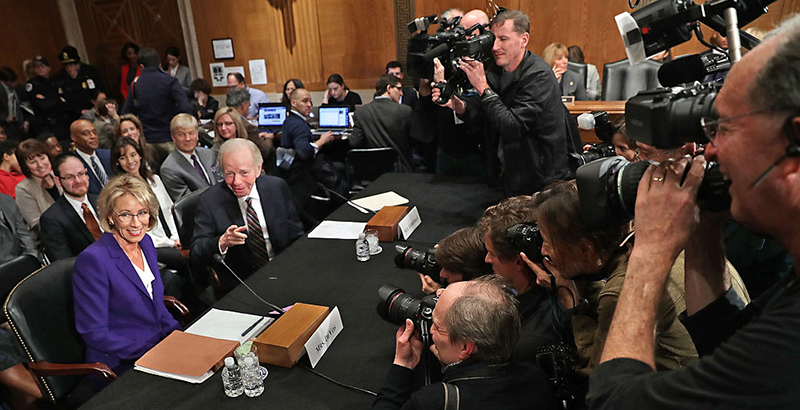This Week’s ESSA News: Congressional Pushback Over Plan Approvals, New Questions About High Standards, Alaska & Iowa Approved by Feds

This update on the Every Student Succeeds Act and the education plans now being refined by state legislatures is produced in partnership with ESSA Essentials, a new series from the Collaborative for Student Success. It’s an offshoot of their ESSA Advance newsletter, which you can sign up for here! (See our recent ESSA updates from previous weeks right here.)
This week, Secretary of Education Betsy DeVos returned to Capitol Hill to appear before the House Education and the Workforce Committee and discuss her agency’s priorities. While members of Congress asked DeVos wide-ranging questions about everything from school safety to Pell Grants, one of the areas where she received the most pushback was ESSA — and the approval of state plans.
As CNN’s Juana Summers reports, DeVos “was pressed by Virginia Rep. Bobby Scott — the committee’s ranking Democrat — over whether she had approved state education plans that violate the law. Scott repeatedly pressed DeVos on plans where school grades don’t include subgroup performance, suggesting that allowed states to ignore disadvantaged groups.”
Secretary DeVos: “It is addressed as required by the law.”
Rep. Scott: “And how is that?”
DeVos: “Whatever the law states, it requires…”
Scott: “What does the law state?”
WATCH: Complete exchange between Secretary @BetsyDeVosED and Rep. @bobbyscott. https://t.co/c1nvtB4cky pic.twitter.com/EqyUsXxRB9
— CSPAN (@cspan) May 22, 2018
1 DeVos approves Alaska and Iowa ESSA plans
On May 16, DeVos announced that Alaska and Iowa had gained federal approval for their state ESSA plans. “I am pleased to approve these plans, which comply with the requirements of the law,” she said. “I encourage states to use their plans as a starting point, rather than a finish line, to improve outcomes for all students.” She noted some “unique elements” from each state’s plan, including Alaska’s goal to cut the number of non-proficient students by 50 percent in a decade, and Iowa’s plan to set “clear and rigorous standards” as well as have educators help students reach them through “high-quality instruction and evidence-based practices.”
Betsy DeVos has given the thumbs up to two more state Every Student Succeeds Act plans: Alaska and Iowa. https://t.co/7iTtBCRgHS pic.twitter.com/ZOLfVf5nW7
— Education Week (@educationweek) May 18, 2018
2 High standards not going anywhere under ESSA?
Kevin Mahnken reports here on The 74 on the findings of a new study from Education Next, which finds that “proficiency standards on state tests have grown more stringent over the past few years, defying worries that they would be dumbed down as the federal government took a more detached approach to school accountability” under ESSA. Overall, the study found that “43 states received a B-minus grade or better from Education Next on their standards, while 16 states and the District of Columbia earned either an A or an A-minus.” However, “only two states received a grade of B or better just nine years ago.”
Most states have adopted high standards and have stuck with them. But standards don’t exist in a vacuum—outside forces and relevant policy gaps should be factored into any analysis of impacts on academic outcomes and achievement. #EdNextStandards
— for Student Success (@StudentSuccess) May 22, 2018
3 State chiefs leveraging data to figure out what works (and what doesn’t)
Chiefs for Change and Results for America released a new report that examines how state chiefs are intensifying efforts to use data to better understand how different programs improve student achievement under ESSA. The report provides a guide for states and districts alike to help them navigate ESSA’s evidence provisions and identifies examples of how states are figuring out new and better ways to determine what is working (and what isn’t). The authors say their “aim is to provide a clear sense of the policies, practices, and conditions states can establish to build evidence and apply it in ways that can help solve problems and improve outcomes for students.”
Closing opportunity gaps for students will require more and better evidence about what works. A new Chiefs for Change and @Results4America report shares how states and districts can build evidence under #ESSA: https://t.co/yeI5LkGDW4 pic.twitter.com/i39QdxEdVh
— Chiefs for Change (@chiefsforchange) May 17, 2018
Get stories like these delivered straight to your inbox. Sign up for The 74 Newsletter

;)